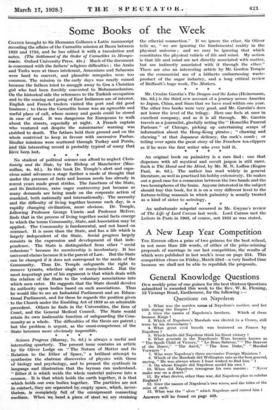No student of political science can afford to neglect Chris-
tianity and the State, by the Bishop of Manchester (Mac- millan, 46. 6d.). • In this book Dr. Temple's alert and capa- cious mind advances a stage further a mode of thought that under the pressure of facts and human needs has already in "reeent years made great strides. The functions of the State, and its limitations, raise eager controversy just because so many demands are being made on the corporate action of mankind, both nationally and internationally. The necessity and the difficulty of living together become each day, in a rapidly changing civilization, more obvious. Dr. Temple, following, Professor George Unwin and Professor McIver, finds that in the process of living together social facts emerge to which the terms Community, State, and Association may be applied.- The Community is fundamental, and not based on contract. R is more than the State, and has a life which is 'largely independent of the State.- Social progress largely consists in the expression and development of that inde- pendence. The State is distinguished from other "social • cohesions '-' because its membership is involuntary. It has universal claims because it is the parent of Law. But the State can be changed if it does not correspond to the needs of the Community. Thus Dr. Temple safeguards the right to remove tyrants, whether single or many-headed. But the most inaportaut part of his argument is that which deals with the relation of the State to the voluntary associations into which men enter. He suggests that the State should devolve its authority upon bodies based on such associations. Thus he would like 'to see an Industrial Parliament and an Educa- tional Parliament, and for these he regards the position given to the Church under the Enabling Act of 1919 as an admirable precedent. Others he finds in the Universities, the Inns of Court, and the General Medical Council. The State would retain its own inalienable function of safeguarding the Com- munity as a whole. The difficulties of the thesis are patent ; but -the problem is urgent, as the omni-competence , of the
- • State-becomes more obviously impossible.










































 Previous page
Previous page